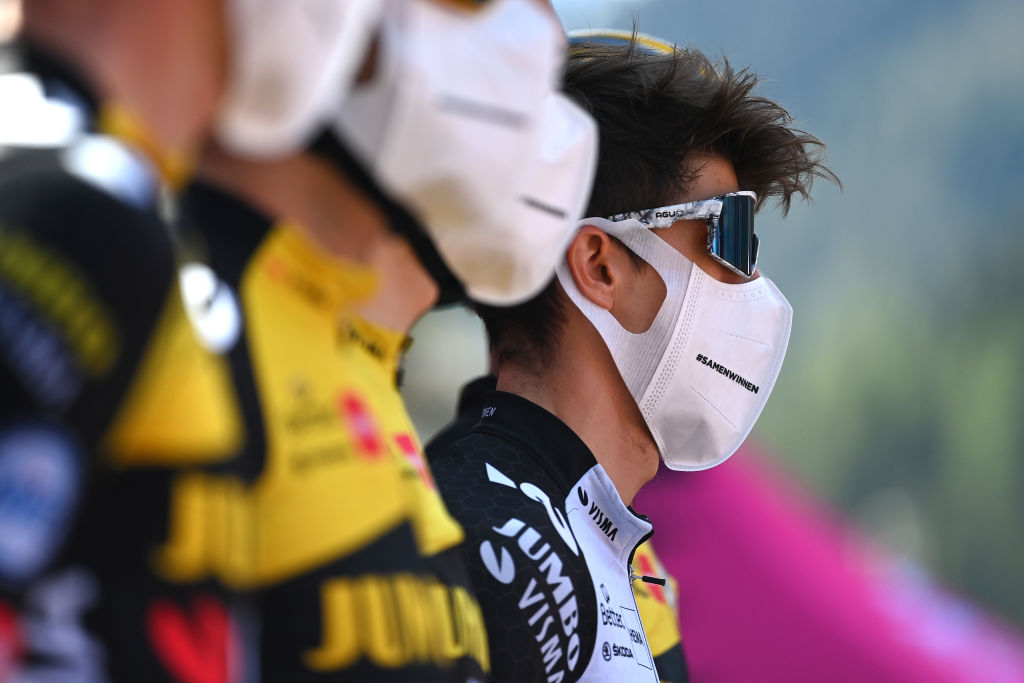
Facemasks, hand disinfectant gels and PCR tests: if you thought they were a thing of the past in cycling, think again. Visma-Lease a Bike have reintroduced a partial COVID-19 protocol at the 2024 Tour de France, Wielerflits reported on Thursday morning, after a number of new coronavirus cases, one affecting their own team, emerged in the peloton.
The entire team, both staff and riders, wore face masks on the plane to Florence for the Grand Départ, the Dutch website reported, and rapid COVID-19 tests will be carried out on the entire squad every day. A special PCR testing machine will be used should further checks be required.
Face masks are once again recommended in places where large numbers of people assemble, although it is not clear whether the team will wear them this evening during their press conference, where a number of their top riders are expected to be present, prior to the team presentation. Anybody with cold or flu-like symptoms will be placed in isolation.
“It will not be easy to convince everyone of the need for this protocol,” Visma-Lease a Bike sources told WielerFlits. “But if you see how much we invest in the Tour de fance, it is only logical that you try to prevent COVID-19 from getting into the team.”
Earlier this week Visma-Lease a Bike announced that Sepp Kuss, a key mountain support rider for Jonas Vingegaard, would not be taking part after he had not fully recovered from a recent case of COVID-19. Kuss reportedly tested negative multiple times before testing positive and his full recovery is taking longer than expected.
In other teams, David Gaudu (Groupama-FDJ) recently caught COVID-19, but has now returned to racing at the Tour after skipping the French Nationals to ensure a full recovery, while Tao Geoghegan Hart (Lidl-Trek) had to pull out of the Tour because of a combination of a fractured rib from a crash and a COVID infection.
Introduced in 2020 as the pandemic swept across the world, most COVID-19 protocols in cycling were finally removed or no longer made obligatory by the UCI at the start of this season, much later than many other sports.
This followed a reduction of the most stringent measures at the start of 2023, such as an obligatory negative test for COVID-19 for all participants and members of the race community prior to attending events. But significant parts of the protocol remained in place.
Throughout the 2023 season, for example, it was still technically required, though, for riders to wear a face mask until a few minutes before the start, and a limited quarantine of infected riders was obligatory.
Even after such restrictions were dropped at the start of this season, the UCI still continued to recommend some practices.
“The virus is still circulating today, and with the winter season, there has been a slight resumption of the epidemic,” a UCI press release said late this December.
“Thanks to extensive vaccination campaigns, however, forms of the disease remain relatively mild, including in susceptible individuals.”
“Wearing a mask, hand hygiene and ventilating enclosed spaces - all effective measures during a pandemic - are still relevant. People who test positive are no longer obliged to isolate, but the continuation of barrier measures remains essential. These are the responsibility of team doctors as part of standard prevention against respiratory infectious diseases.”
Last year’s Giro d’Italia was the last Grand Tour to be severely affected by COVID-19, with multiple riders from Jumbo-Visma, as the team was known, being forced to pull out even before the start and race leader Remco Evenepoel (Soudal-QuickStep) and most of his team subsequently quitting.
Get unlimited access to all of our coverage of the Tour de France - including journalists reporting, breaking news and analysis on the ground from every stage of the race as it happens and more. Find out more.







